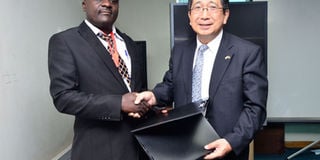Japan gives Shs1b for schools, hospitals

Granted. Japanese ambassador Kazuaki Kameda (R) and Mr Kereson Katongole, the head teacher of St Agatha Girls’ Secondary School, shake hands after signing a grant for grassroots human security projects at the Japanese Embassy in Kampala yesterday. PHOTO BY ALEX ESAGALA
What you need to know:
- Good deed. The money will be used to construct bathrooms and classroom blocks.
KAMPALA.
The Japanese government has committed Shs1.3b in grants for school and hospital infrastructure projects under their flagship programme the Grassroots Human Security Projects in five upcountry districts.
The grants were signed yesterday between the Japanese Ambassador to Uganda, Mr Kazuaki Kameda, and respective projects representatives from Kapchorwa, Rubanda, Kitgum, Soroti, and Arua districts at the Japanese Embassy in Kampala. The money will be used to, among other things, construct school laboratories, dormitories and classroom blocks.
The initiative, the embassy said, is part of the new partnership with African countries through the Tokyo International Conference on African Development (TICAD) process geared towards promoting achievement of the United Nations Sustainable Development Goals (SDGs).
TICAD is a forum for Japan, the world’s third largest developed economy, to bridge the gap with Africa which is believed to be the next frontier of investment
At the just concluded TICAD meeting under the theme “Partnership for shared prosperity” in Nairobi last year, attended by 36 African heads of state, Japanese prime minister Shinzo Abe pledged his country’s commitment of Shs132 trillion ($30b) to support infrastructure development, healthcare expansion and education programmes on the continent. The Shs132 trillion for over the next five years is in supplement to the Shs141 trillion ($32b) that Japan committed to Africa during the last TICAD summit in 2013.
Ambassador Kameda, said his government has since supported about 215 of such projects with the view of improving human quality to achieve sustainable community development. “It is my sincere wish that all the projects will be implemented as planned,” he remarked.
The process
The receiving organisations from the five districts were drawn from an array of applications. One of the projects is a library for the Kitgum local government, of the districts in the country with low literacy levels, according to the Uganda Bureau of Statistics.
Kitgum District chief administrative officer Joseph Lomongin said the district has been trailing nationwide in education standards but expressed optimism that the construction of a functional adult literacy centre and child protection programmes, “will contribute to increased children’s access to books and learning.”




